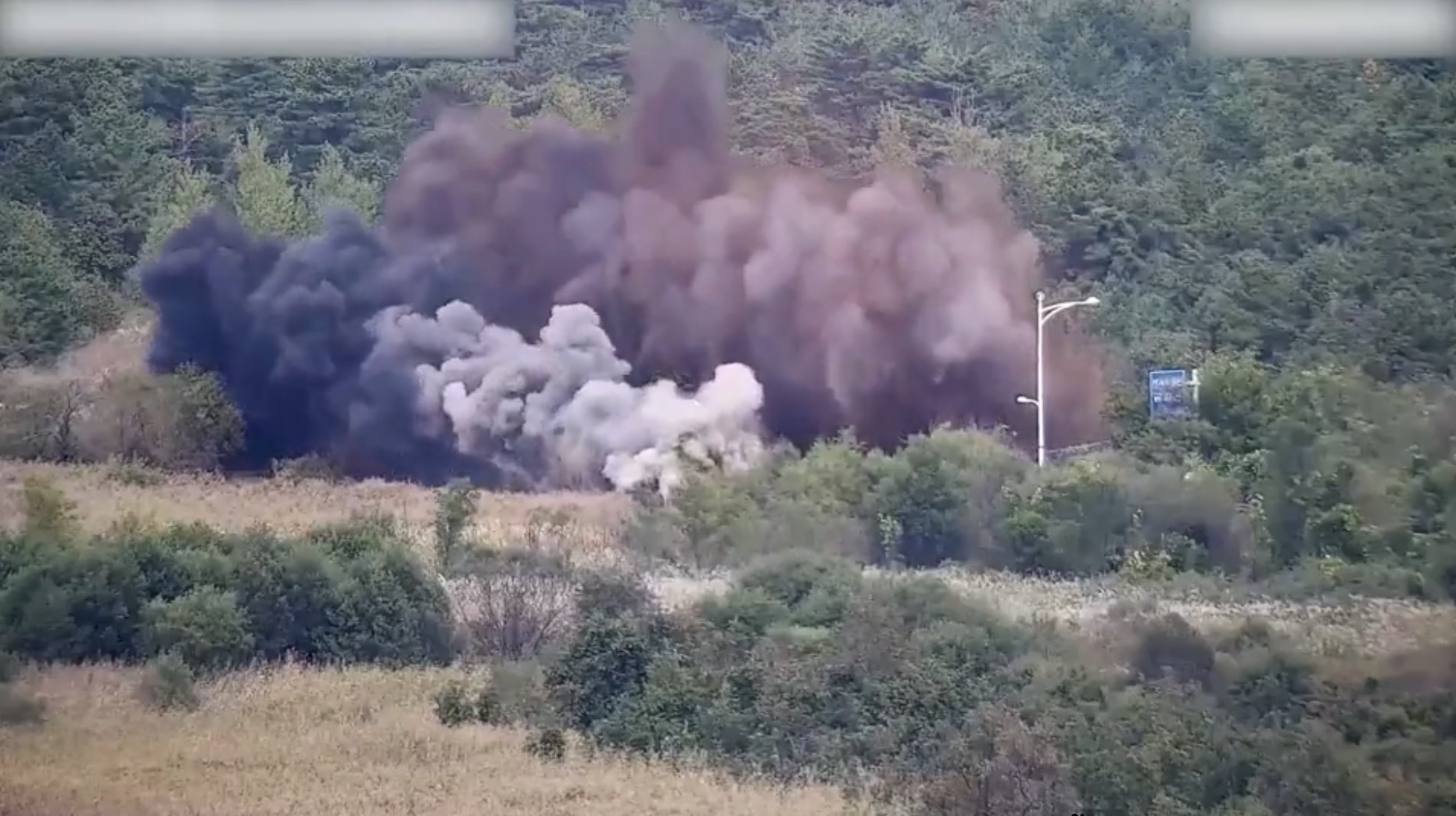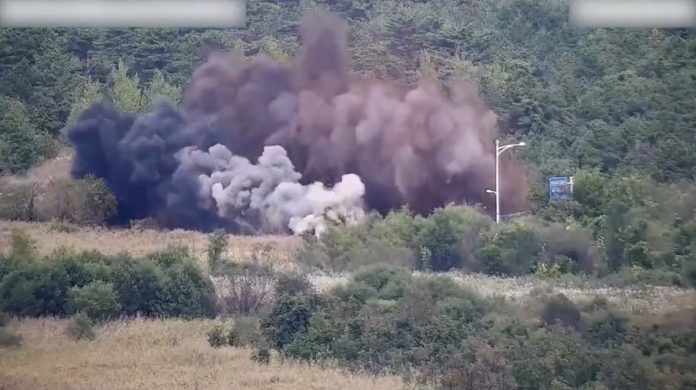ทางการเกาหลีใต้รายงานว่า เกาหลีเหนือได้ระเบิดถนนสายหลักสองสายที่เชื่อมไปยังภาคใต้ของคาบสมุทรเมื่อวันอังคารที่ผ่านมา หลังจากที่เปียงยางออกคำเตือนว่าจะดำเนินการตัดดินแดนของตนออกจากเกาหลีใต้อย่างสมบูรณ์
เส้นทางบางส่วนของถนนสายคยองอึยทางชายฝั่งตะวันตกและถนนสายทงแฮทางชายฝั่งตะวันออก ซึ่งเป็นทางรถไฟและถนนสายหลักที่เชื่อมต่อเกาหลีเหนือและใต้ ถูกทำลายด้วยการระเบิดเมื่อเวลาประมาณเที่ยงวัน ตามเวลาท้องถิ่นเกาหลี ตามรายงานจากกองบัญชาการทหารร่วมของเกาหลีใต้ (JCS)
การทำลายเส้นทางเหล่านี้ในทางปฏิบัติไม่มีผลกระทบมากนัก เนื่องจากทั้งสองประเทศถูกแบ่งแยกด้วยเขตแดนที่มีการป้องกันแน่นหนาที่สุดแห่งหนึ่งของโลก และถนนเหล่านี้ไม่ได้ใช้งานมาหลายปีแล้ว แต่การระเบิดนี้มีความหมายเชิงสัญลักษณ์ในช่วงเวลาที่ผู้นำทั้งสองเกาหลีกำลังใช้วาทะรุนแรงใส่กัน
วิดีโอที่เผยแพร่โดยกระทรวงกลาโหมเกาหลีใต้แสดงให้เห็นการระเบิดบนถนนฝั่งเหนือของเส้นแบ่งเขตทหารที่แยกสองประเทศออกจากกัน จากนั้นจึงมีการนำเครื่องจักรหนักเช่น รถบรรทุกและรถขุด มาทำงานในบริเวณนั้น ซึ่งถูกปิดกั้นบางส่วนด้วยกำแพงสีดำตามที่เห็นในวิดีโอ กองบัญชาการทหารร่วมกล่าวว่า เกาหลีเหนือกำลังทำ “งานเพิ่มเติมด้วยเครื่องจักรหนัก” ในพื้นที่นี้ แต่ไม่ได้ระบุรายละเอียดเพิ่มเติม
หลังจากการระเบิด ทางทหารเกาหลีใต้ได้เปิดฉากยิงภายในพื้นที่ทางใต้ของเส้นแบ่งเขตทหาร และเฝ้าติดตามการเคลื่อนไหวของกองทัพเกาหลีเหนืออย่างใกล้ชิด พร้อมทั้งรักษาสถานะเตรียมพร้อมสูงสุดภายใต้ความร่วมมือกับสหรัฐฯ ตามคำแถลงของ JCS
เมื่อวันจันทร์ เกาหลีใต้กล่าวว่าพบสัญญาณว่าเกาหลีเหนือกำลังเตรียมการระเบิดถนนที่เชื่อมต่อสองประเทศ และเตือนว่าการระเบิดอาจเกิดขึ้นได้ทุกเมื่อ ทางทหารได้ดำเนินมาตรการรับมือ แต่ไม่ได้ให้รายละเอียดเพิ่มเติม
โฆษกของ JCS อีซองจุน กล่าวว่า ทหารเกาหลีใต้พบผู้คนทำงานอยู่หลังสิ่งกีดขวางที่ติดตั้งบนถนนฝั่งเกาหลีเหนือของชายแดน
การระเบิดนี้เกิดขึ้นหลังจากที่เกาหลีเหนือกล่าวหาเกาหลีใต้ว่าได้ส่งโดรนบรรจุโฆษณาชวนเชื่อเข้าไปในกรุงเปียงยาง และขู่ว่าจะ “ตอบโต้” ซึ่งเป็นเหตุการณ์ล่าสุดในความขัดแย้งระหว่างสองประเทศที่ดำเนินมาหลายเดือน นับตั้งแต่ที่เกาหลีเหนือส่งบอลลูนขยะมาทางเกาหลีใต้
สัปดาห์ที่แล้ว กองทัพเกาหลีเหนือเตือนว่าจะดำเนิน “มาตรการทางทหารที่เด็ดขาด” เพื่อตัดดินแดนของตนออกจากเกาหลีใต้อย่างสมบูรณ์ หลังจากผู้นำเกาหลีเหนือ คิมจองอึน ยกเลิกนโยบายที่มุ่งหวังการรวมชาติอย่างสันติกับเกาหลีใต้เมื่อช่วงต้นปีนี้
เกาหลีเหนือและเกาหลีใต้ถูกแบ่งแยกตั้งแต่สงครามเกาหลีสิ้นสุดลงในปี 1953 ด้วยข้อตกลงสงบศึก แม้ว่าทั้งสองฝ่ายจะยังคงอยู่ในสถานะสงคราม แต่รัฐบาลของทั้งสองประเทศเคยตั้งเป้าหมายร่วมกันว่าในวันหนึ่งอาจรวมชาติได้
ในเดือนมกราคม คิมกล่าวว่า เกาหลีเหนือจะไม่แสวงหาการปรองดองและการรวมชาติอีกต่อไป โดยเรียกความสัมพันธ์ระหว่างสองประเทศว่า “ความสัมพันธ์ระหว่างประเทศที่เป็นศัตรูและคู่สงคราม” ตามรายงานของสำนักข่าว KCNA ในขณะนั้น
สถานการณ์ทางทหารที่ตึงเครียด
ในแถลงการณ์ที่เผยแพร่โดยสำนักข่าว KCNA เมื่อวันที่ 9 ตุลาคม กองบัญชาการทหารประชาชนเกาหลี (KPA) ประกาศว่า ถนนและทางรถไฟที่เหลืออยู่ซึ่งเชื่อมต่อกับเกาหลีใต้จะถูกตัดขาดอย่างสมบูรณ์ ปิดกั้นการเข้าถึงตามแนวชายแดน
“สถานการณ์ทางทหารที่ตึงเครียดบนคาบสมุทรเกาหลีต้องการให้กองกำลังติดอาวุธของเกาหลีเหนือดำเนินมาตรการที่เด็ดขาดและเข้มแข็งขึ้น เพื่อปกป้องความมั่นคงของชาติอย่างมีประสิทธิภาพมากขึ้น” ตามที่ระบุในประกาศของ KCNA ซึ่งใช้ชื่อทางการของประเทศว่า สาธารณรัฐประชาธิปไตยประชาชนเกาหลี (DPRK)
กองบัญชาการทหารระบุว่า มาตรการดังกล่าวเป็นการตอบโต้ต่อ “การซ้อมรบทางสงคราม” ที่จัดขึ้นในเกาหลีใต้เมื่อไม่นานมานี้ รวมถึงการเยือนของยุทโธปกรณ์นิวเคลียร์ยุทธศาสตร์ของสหรัฐฯ ในภูมิภาค ในช่วงปีที่ผ่านมา เรือบรรทุกเครื่องบินของสหรัฐฯ เรือโจมตีสะเทินน้ำสะเทินบก เครื่องบินทิ้งระเบิดระยะไกล และเรือดำน้ำได้มาเยือนเกาหลีใต้ ทำให้เปียงยางไม่พอใจและวิพากษ์วิจารณ์อย่างรุนแรง
ตั้งแต่เดือนมกราคม เกาหลีเหนือได้เสริมความแข็งแกร่งให้กับการป้องกันชายแดนของตน โดยวางทุ่นระเบิด สร้างกับดักต่อต้านรถถัง และรื้อถอนโครงสร้างทางรถไฟ ตามข้อมูลของทหารเกาหลีใต้
ผู้นำเกาหลีเหนือและเกาหลีใต้ต่างเพิ่มวาทะรุนแรงในช่วงที่ผ่านมา
เมื่อต้นเดือนนี้ คิมขู่จะใช้อาวุธนิวเคลียร์เพื่อทำลายเกาหลีใต้หากถูกโจมตี หลังจากที่ประธานาธิบดีเกาหลีใต้เตือนว่าหากเกาหลีเหนือใช้อาวุธนิวเคลียร์ จะ “เผชิญกับจุดจบของระบอบการปกครอง”
ความคิดเห็นเหล่านี้เกิดขึ้นในขณะที่เกาหลีเหนือดูเหมือนจะเร่งการผลิตอาวุธนิวเคลียร์และกระชับความสัมพันธ์กับรัสเซีย ซึ่งทำให้ชาติตะวันตกกังวลอย่างมากเกี่ยวกับทิศทางของประเทศที่แยกตัวนี้
Leif-Eric Easley ศาสตราจารย์จากมหาวิทยาลัยอีฮวาในกรุงโซลชี้ว่า การที่เกาหลีเหนือตัดดินแดนของตนออกจากเกาหลีใต้อาจเป็นความพยายามของคิมในการ “เบี่ยงเบนความผิดจากความล้มเหลวทางเศรษฐกิจ และสร้างความชอบธรรมให้กับการเสริมสร้างขีปนาวุธและอาวุธนิวเคลียร์ที่มีค่าใช้จ่ายสูง” โดยการขยายภัยคุกคามจากภายนอก
“คิมจองอึนต้องการให้ทั้งประชาชนภายในประเทศและต่างประเทศเชื่อว่าเขากำลังดำเนินการด้วยความเข้มแข็งทางทหาร แต่แท้จริงแล้วเขาอาจถูกขับเคลื่อนด้วยความอ่อนแอทางการเมือง” เขากล่าว “ภัยคุกคามของเกาหลีเหนือ ทั้งที่เป็นจริงและเชิงวาทกรรม สะท้อนให้เห็นถึงกลยุทธ์การอยู่รอดของระบอบเผด็จการสืบทอดอำนาจ”
North Korea blows up roads near border with South after warning it would completely cut ties

North Korea blew up parts of two major roads connected to the southern part of the peninsula on Tuesday, South Korean authorities said, after Pyongyang warned it would take steps to completely cut off its territory from the South.
Parts of the Gyeongui line on the West coast and Donghae line on the East coast, two major road and railway links connecting the North and South, were destroyed by explosives at around 12 p.m. Korean local time, according to Seoul’s Joint Chiefs of Staff (JCS).
In practical terms, the destruction of the travel routes makes little difference – the two Koreas remain divided by one of the world’s most heavily fortified borders and the roads were not in use for years. But its symbolism comes at a time of particularly fiery rhetoric between the two Korean leaders.
Video shared by the South Korean Defense Ministry showed several explosions on roads on the north side of the military demarcation line that separates two Koreas. Heavy machinery including trucks and excavators were then deployed to at least one of the roads, which was partially blocked by a black barrier, according to the video. The JCS said the North was conducting “additional works with heavy machinery” at the scene, but didn’t specify further.
In response to the explosions, the South Korean military opened gunfire within the area south of the military demarcation line and is closely monitoring the North Korean military’s movements, maintaining “fully readiness posture under cooperation with the US,” the JCS said.
On Monday, South Korea said it had detected signs that North Korea was preparing to demolish roads that connect the two countries, warning that the explosions could occur imminently. Its military had implemented countermeasures, the Defense Ministry said, but did not provide specifics.
A spokesman for the JCS, Lee Sung-joon, said the South Korean military detected people working behind barriers installed on the roads on the North’s side of the border.
The blasts come a few days after North Korea accused South Korea of flying propaganda-filled drones over its capital Pyongyang and threatened “retaliation,” in the latest tit-for-tat exchange following months of Pyongyang sending trash-laden balloons to the South.
Last week, North Korea’s army warned that it would take the “substantial military step” of completely cutting off its territory from South Korea, after North Korean leader Kim Jong Un scrapped a longstanding policy of seeking peaceful reunification with the South earlier this year.
North and South Korea have been separated since the Korean War ended in 1953 with an armistice agreement. The two sides are still technically at war, but both governments had long sought the goal of one day reunifying.
In January, Kim said North Korea would no longer seek reconciliation and reunification with South Korea, calling inter-Korean relations “a relationship between two hostile countries and two belligerents at war,” KCNA reported at the time.
An ‘acute military situation’
In a statement carried by state-run news agency KCNA on October 9, the general staff of the Korean People’s Army (KPA) declared that remaining roads and railways connected to the South would be completely cut, blocking access along the border.
“The acute military situation prevailing on the Korean peninsula requires the armed forces of the DPRK to take a more resolute and stronger measure in order to more creditably defend the national security,” he said in the KCNA notice that referred to North Korea by the initials of its official name, the Democratic People’s Republic of Korea.
The general staff said the measures were a response to recent “war exercises” held in South Korea and visits by what it claims were US strategic nuclear assets in the region. Over the past year, a US aircraft carrier, amphibious assault ships, long-range bombers and submarines have visited South Korea, drawing angry rebukes from Pyongyang.
Since January, Pyongyang has fortified its border defenses, laying land mines, building anti-tank traps and removing railway infrastructure, according to the South Korean military.
The North and South Korean leaders have also ramped up the use of fiery rhetoric.
Earlier this month, Kim threatened to use nuclear weapons to destroy South Korea if attacked, after South Korea’s president warned that if the North used nuclear weapons it would “face the end of its regime.”
The comments came as North Korea appears to have intensified its nuclear production efforts and strengthened ties with Russia, deepening widespread concern in the West over the isolated nation’s direction.
Leif-Eric Easley, a professor at Ewha Womans University in Seoul, suggests North Korea’s move to cut its territory off from the South could be a way for Kim to “shift blame for its economic failures and legitimize its costly buildup of missiles and nuclear weapons” by exaggerating external threats.
“Kim Jong Un wants domestic and international audiences to believe he is acting out of military strength, but he may actually be motivated by political weakness,” he said. “North Korea’s threats, both real and rhetorical, reflect the regime survival strategy of a hereditary dictatorship.”
By Gawon Bae, Yoonjung Seo and Alex Stambaugh, CNN

















